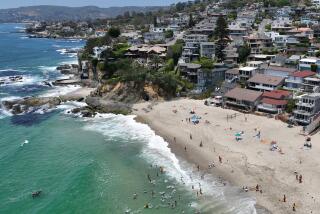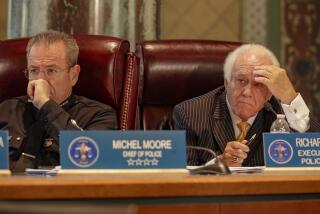‘Criminals’ Have Zero Tolerance for Public Imbibing Law
JACKSONVILLE BEACH, Fla. — Handcuffs left bruises on Deborah McNulty’s wrists. A body search made her feel violated. When police tossed her in jail with suspected murderers, drugs users and sex criminals, she trembled in fear.
Her crime?
Walking away from an outdoor beach bar with a cocktail in her hand.
Police hauled McNulty and dozens of others to jail for the same offense during Jacksonville Beach’s annual beach opening celebration in May.
The 32-year-old Jacksonville woman and others snared in the beach’s “zero tolerance” policy toward public drinking spent a night in jail and were fined $100 each.
“The prisoners were the most humane people in this whole ordeal,” McNulty said.
In the past, police used warnings and tickets to enforce an anti-drinking ordinance approved in 1993, but their efforts were mostly unsuccessful. So this year, they are arresting people.
“We want people to come to Jacksonville Beach and have a good time, and we want them to obey the law,” said Police Chief Bruce Thomason.
McNulty, a financial services and tax expert, was unwinding from a long tax season May 3, when she and her boyfriend went to the Crab Pot for a drink.
“It was loud and crowded, so we stepped off the patio,” she said.
They walked over to a nearby bench and were talking quietly when police came over and asked them if the drinks sitting on the bench belonged to them.
When they said yes, they were arrested, handcuffed and taken to the Jacksonville Beach Police Department and later transported to the Duval County Jail.
A jail matron with rubber gloves examined McNulty’s breasts and reached into her pants to make sure she wasn’t carrying weapons or drugs.
“They said I couldn’t keep my bra because it was a potential weapon,” McNulty said.
She was forced to dress in prison underwear and put on prison clothes. She was photographed and fingerprinted.
After the processing, she was thrown in with the general prison population.
“I was scared and terrified,” McNulty said.
Maria Fernandez was winding up her Florida vacation when she was arrested outside the same bar.
“It was extremely loud, so we moved a few feet away,” the 29-year-old Violet, La., woman said. That’s when police arrested her and a friend.
Her jail experiences were similar to McNulty’s, but as a result of her arrest, Fernandez missed her plane and was forced to pay for her rental car and motel room for an extra day.
“It’s a bad experience. I am never coming back here,” she said. “It was like we were common criminals. We didn’t kill nobody.”
McNulty is so irate about her arrest and treatment that she has begun a petition drive urging police to use discretion in enforcing the law--especially if the violator is neither drunk nor disorderly. Neither she nor Fernandez was, they say.
McNulty presented a petition to the Jacksonville Beach City Council in early June, urging that police warn or ticket individuals, not toss them in jail.
“We spent nearly 18 horrifying, humiliating hours through this ordeal,” she said. “Once the handcuffs were on us, we went from being human beings to hardened criminals.”
Chief Thomason did not return phone calls to the Associated Press, but he told the council that his officers did what they were hired to do: enforce the laws.
Thomason said he has always told his officers to use discretion in enforcing the law--a comment that brought chuckles from those attending the meeting who had been arrested.
Councilwoman Bennie Furlong said the law was approved in 1993 in response to rowdy drinking, public urination and women “taking their tops off.” Those things drove families away from the beaches, she said.
The Jacksonville Beach law is far tougher than corresponding laws in neighboring communities in the county. Atlantic and Neptune Beach police merely ask people caught imbibing in public to pour out their drinks.
But Furlong believes the police should use discretion instead of tossing out a net and catching anyone who unknowingly violates the law.
Warnings should be issued to first-offenders, she said, adding that police should simply tell violators to pour out their drinks.
She wants the city to put up more warning signs in local bars, so people will know it is illegal to leave with a drink. Signs are also being posted along the boardwalk.
Council members did not say at the meeting whether they would change the law or the way police enforce it.
David Potts, chairman of the Jacksonville Convention and Visitor’s Bureau, said he does not think a crackdown will have an effect on tourism. He also said the enforcement has improved beach conditions. “It is a much safer environment for both residents and tourists,” he said.
But Potts said he wants to make sure there are adequate warning signs. He expressed concern about tourists being arrested without warning.
“That’s not the message we want to send,” he added.
More to Read
Sign up for Essential California
The most important California stories and recommendations in your inbox every morning.
You may occasionally receive promotional content from the Los Angeles Times.










